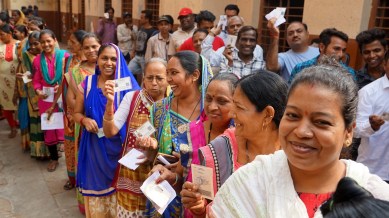Stay updated with the latest - Click here to follow us on Instagram
Defer SIR in Maharashtra until local polls are held in January, SEC requests EC
The State Election Commission had conveyed the inability to conduct SIR until January 2026 in the first week of September itself when the EC was planning to hold a conference of Chief Electoral Officers from across the state.

Amid Election Commission’s plan for a nationwide Special Intensive Revision (SIR) of electoral rolls, the Maharashtra State Election Commission (SEC) has requested the Election Commission to defer the process in the state till January 2026. It has pointed out the upcoming local body polls as a reason for the same as it said ‘officials will be busy in the electoral process.’
In a letter dated September 9, the SEC wrote, “The Hon’ble Supreme Court of India has vide its order dated 6th May 2025 directed the State Election Commission to make an endeavour to conclude the elections to local bodies in Maharashtra within a period of four months while granting liberty to the State Election Commission to seek extension of time in appropriate cases. Elections to all 29 Municipal Corporations, all 247 Municipal Councils, 42 Nagar Panchayats out of 147 Nagar Panchayats, 32 Zilla Parishads out of 34 Zilla Parishads and 336 Panchayat Samitis out of 351 Panchayat Samitis are due in Maharashtra.”
It further requested to defer conducting SIR exercise in the state as the officials that would conduct the SIR and the local body polls would be the same.
“Tentatively, the process of elections for all these bodies is likely to continue till January 2026 during which time most of the deputy collectors and tahsildars (who are appointed as Returning Officers and Assistant Returning Officers for local body elections) in the state will be engaged in these elections. As the field staff including deputy collectors and tahsildars are the same officers for local body elections and revision of Assembly electoral roll, it is requested that the programme for Special Intensive Revision, in case any such programme is planned to be undertaken, be deferred till at least the end of January 2026,” the SEC said.
The State Election Commission had conveyed the inability to conduct SIR until January 2026 in the first week of September itself when the EC was planning to hold a conference of Chief Electoral Officers from across the state.
It informed that currently the delimitation of wards of Zilla Parishads and Panchayat Samitis is complete while the process of delimitation of wards for Municipal Corporations, Municipal Councils and Nagar Panchayats is due to be completed shortly. The process of bifurcation of Legislative Assembly electoral rolls for these local bodies will be taken up next and then the actual elections will be conducted.
Intensive Revision involves a full, fresh preparation of electoral rolls through house-to-house enumeration. Enumerators visit every household to record eligible electors as of a qualifying date, without reference to existing rolls. This is done when the EC determines that the current rolls are outdated, inaccurate, or require complete rebuilding — typically before major elections or after administrative exercises such as delimitation of constituencies. The nomenclature ‘Special Intensive Revision’ indicates that the EC is exercising its discretionary powers under Section 21(3) of the 1950 law, which permits it to revise electoral rolls “in such manner as it thinks fit”.
The SIR was ordered in Bihar in June 2025, months before the Assembly elections, by requiring voters to produce one of 11 documents to prove eligibility, the move drew criticism and challenges in court for resembling a citizenship check. Under the June 24 order, any person not listed in the 2003 electoral rolls—an estimated 2.93 crore individuals—had to submit at least one of 11 documents to prove their eligibility to vote. These included identity cards or pension orders issued to regular Central/ State government employees or pensioners; certificates or documents issued by government, local authorities, banks, post offices, LIC or PSUs prior to July 1, 1987; birth certificates; passports; matriculation or educational certificates; permanent residence certificates; forest right certificates; OBC/ SC/ ST or caste certificates issued by competent authorities; entries in the National Register of Citizens (where applicable); family registers and government-issued land or house allotment certificates. After it was challenged in the Supreme Court, it directed the EC to accept Aadhaar card as 12th document.